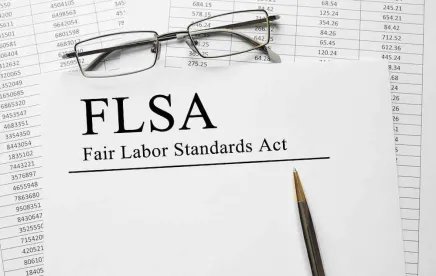Employees who assert wage claims available only under the federal Fair Labor Standards Act (FLSA) cannot recover the greater remedies available under the Massachusetts Wage Act (MWA), the Massachusetts Supreme Judicial Court has held. Devaney v. Zucchini Gold, LLC, 2022 Mass. LEXIS 156 (Mass. Apr. 14, 2022).
In so ruling, the high court rejected the conclusion of several lower court decisions that had allowed such state law remedies for violations of the FLSA.
Differences Between Massachusetts and Federal Wage Law
Although the MWA mirrors the FLSA in many respects, they are not identical. Under the FLSA, either a two- or three-year statute of limitations applies, depending on whether the claimant can demonstrate that the employer acted “willfully.” In addition, a prevailing plaintiff is entitled to costs, attorney’s fees, and potential liquidated damages equal to the amount of lost wages (i.e., double damages). However, under Massachusetts state law, all claims are subject to a three-year limitations period and, in addition to attorney’s fees and costs, violations are subject to mandatory triple damages.
Another difference is the types of exemptions from the respective laws’ overtime requirements. For example, all employees who work in a restaurant, hotel, hospital, or gasoline station are exempt from the overtime requirements of Massachusetts law, whereas these exemptions do not exist under the FLSA.
The Lawsuit
Plaintiff Rutchada Devaney was an employee at the Rice Barn, a Needham, Massachusetts restaurant owned by the defendant corporation. She and several other employees filed suit against the company, alleging violations of the FLSA for failure to pay overtime wages; violations of the MWA for failure to pay the overtime wages in a timely manner; and violations of both the MWA and FLSA for failure to properly pay minimum wages.
The evidence demonstrated that these plaintiffs routinely worked well in excess of 40 hours per week, but were paid a day rate, which was reduced when the plaintiffs were absent for part of a day and only half of which was paid on weekends, when the restaurant was open just for dinner.
Following pretrial discovery, the superior (trial) court granted summary judgment to the plaintiffs on their FLSA overtime and MWA claims. Based on the judge’s instructions in a separate trial on damages, a jury awarded each of the plaintiffs actual overtime damages at one-and-a-half times their “regular rate” for all overtime hours worked. The judge then trebled the plaintiffs’ actual damages and awarded them attorney’s fees and costs. The defendant appealed.
High Court Decision
On appeal, the Supreme Judicial Court reversed and remanded the case, concluding that the trial court had both improperly instructed the jury on the calculation of actual damages and in awarding treble damages under the MWA for overtime claims that were viable only under the FLSA.
As to the plaintiffs’ actual damages calculation, the Supreme Judicial Court concluded that, because the plaintiffs were paid a day rate, the proper calculation of their overtime wages is set forth in 29 C.F.R. § 778.112, which provides the calculation methodology for employees who are paid “a flat sum for a day’s work … without regard to the number of hours worked in the day … and [who] receive[ ] no other form of compensation for services.” Under these circumstances, the employee’s “regular rate is determined by totaling all the sums received at such day rates … in the workweek and dividing by the total hours actually worked” and the employee “is then entitled to extra half-time pay at this rate for all hours worked in excess of [forty] in the workweek.”
This is so because the employee’s day rate was intended to compensate them for all hours worked. In effect, they already have been paid their regular rate for the non-overtime hours they worked each week. Thus, they were entitled only to the additional one-half the regular rate for their unpaid overtime hours.
More significantly, the Supreme Judicial Court further held that the trial court improperly had awarded treble damages under the MWA when the plaintiffs had asserted their overtime claims only under the FLSA. As noted above, the plaintiffs worked at a restaurant and, thus, were exempt from the overtime provisions of the MWA. Therefore, their unpaid overtime claims were viable only under the FLSA.
While recognizing that the FLSA does not fully preempt state wage and hour laws, and, in fact, the Act expressly states that it does not do so, the high court concluded that “allowing an employee aggrieved by a violation of the Federal overtime law to elect State wage act remedies for untimely payments of wages due solely under the FLSA would present an ‘obstacle to the accomplishment and execution of the full purposes and objectives’ of the FLSA” (quoting Sawash v. Suburban Welders Supply Co., 407 Mass. 311, 314 (1990)). Thus,
while Federal “courts are all over the map on whether plaintiffs may bring [S]tate law claims in addition to FLSA claims for the same conduct, … [t]he common thread is this: When the FLSA provides a remedial measure, it conflicts with similar [S]tate law causes of action and thus preempts them; when the FLSA does not provide a remedial measure, there is no preemption.
In this case, the FLSA unquestionably provides a comprehensive scheme of remedies for overtime pay violations that conflicts in significant ways with the MWA’s remedy provisions. In addition to the difference in the amount of liquidated damages available, the FLSA provides a defense to those damages where the employer can demonstrate a reasonable, good-faith basis for its actions, whereas the MWA imposes strict liability for established violations. Moreover, the FLSA’s standard statute of limitations is two years, with a third year available only if the plaintiff can demonstrate “willful” conduct on the part of the defendant, while the MWA’s limitations period is three years for all claims. Therefore, concluded the Supreme Judicial Court, the only way to avoid conflict between the two laws is to allow only those remedies available under the FLSA when claims are asserted solely under that federal law.
Takeaway
The Supreme Judicial Court’s ruling should be welcome news for employers, who no longer must face claims for the greater damages available under state law when the sole basis for liability is the FLSA.





 />i
/>i

